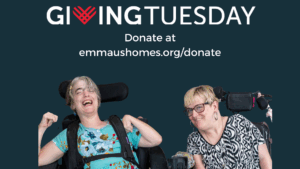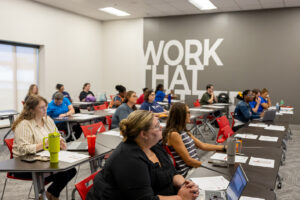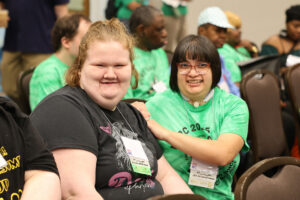E-Advocates
The ability to communicate and be understood is a fundamental human right! Just like those who speak, individuals with disabilities who are nonspeaking or minimally speaking, have plenty to say. All humans feel, think, and interpret what others are saying, understand what is said to or about them, and more. Unfortunately, nonspeaking people are often ignored or underestimated. Because they cannot verbalize to communicate, this verbal society often creates huge access barriers for those who rely on alternate communication.
Sometimes the barrier is simply that no one gives enough time to a nonspeaker to express their needs with whatever communication form is available to them. Other times, people assume that nonspeaking or minimally speaking means nonthinking, nonfeeling, etc. None of that is true! Sometimes the nonspeaker does not have access to the technology they need to communicate.
So why am I bringing this up on a blog about advocacy? Well, many of our clients, who are adults with IDDs, and adults served by others, need some kind of communication support. There is a lot of technology out there, ranging from low tech options like communication boards or PEX (picture exchange cards) to tablets and devices devoted to communication. The devices run a program or app that is identified as most beneficial for the individual. A speech language pathologist must evaluate each person to assess their communication needs, have individuals try out different types of Augmentative and Alternative Communication (AAC, for short) systems, and then finally assist the individual with acquiring the appropriate device. Some nonspeakers choose to type in a program like a word processor and use a type-to-talk feature. There is so much technology out there, and we hope that is exciting news.
Because we want every person with IDDs to advocate for themselves and their needs, whether at the state Capitol or within their own communities, all must be able to communicate. We’re thinking about how to make Missouri disability advocacy more effective by ensuring everyone can be heard and speak for themselves in whatever way works for the individual! We cannot continue to grow our advocacy efforts at Emmaus without growing everyone’s capacity for communication.
Furthermore, as the mother of a child who is nonspeaking, I can safely say that my daughter’s AAC device has been life changing for all of us. Yes, I can look at my child and often know what she needs or wants. However, as she ages, her thoughts and desires are more complex. Sometimes she just wants to make fun of me or tell me she loves me. Other times, her ability to simply say yes or no, or stop, gives her more control over her life. My daughter’s ability to say these phrases and hundreds of other phrases and words means she is already advocating for herself at the age of 9. Everyone deserves this!
For more information on this topic, check these organizations and websites out:


